A more dignified way to celebrate Valentine’s Day would have been difficult to find in aamchi Mumbai, where Rotarians had turned out in their elegant best to celebrate The Rotary Foundation’s honouring its biggest benefactor in India — Rajashree Birla, Chairperson of the Aditya Birla Centre for Community Initiatives and Rural Development.
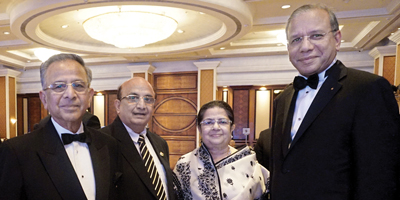
Her solidarity and support to Rotary through the last couple of decades as it battled on to end the scourge of polio from India is well known, and as PRIP Rajendra K Saboo pointed out at the Black Tie Dinner, when the history of polio eradication in India is written, her name will figure prominently. He announced that after Bill and Melinda Gates Foundation, Rajashree’s contribution to TRF for polio eradication was the second highest — a whopping $9.5 million. “I’ve just confirmed it with the incoming TRF Chair Kalyan Banerjee,” he added.
The Gates could have skipped Rotary as a partner, and gone to work on their own in polio eradication. But they came to us.
– K R Ravindran
But even though mammoth, her contribution was much more than money and came with a human touch. Her organisation was involved in many projects; the Group spends Rs 1.6 billion a year in education, health care, water and sanitation and women’s empowerment. “But she got involved in polio eradication, Rotary’s highest priority project, as she felt Rotary is a platform she could work with. I have seen Rajashreeji going to the slums herself, putting the drops in the mouths of the children. She never stopped to think whether that place was hygienic or not; she would alight from the car and walk with us, the volunteers.”
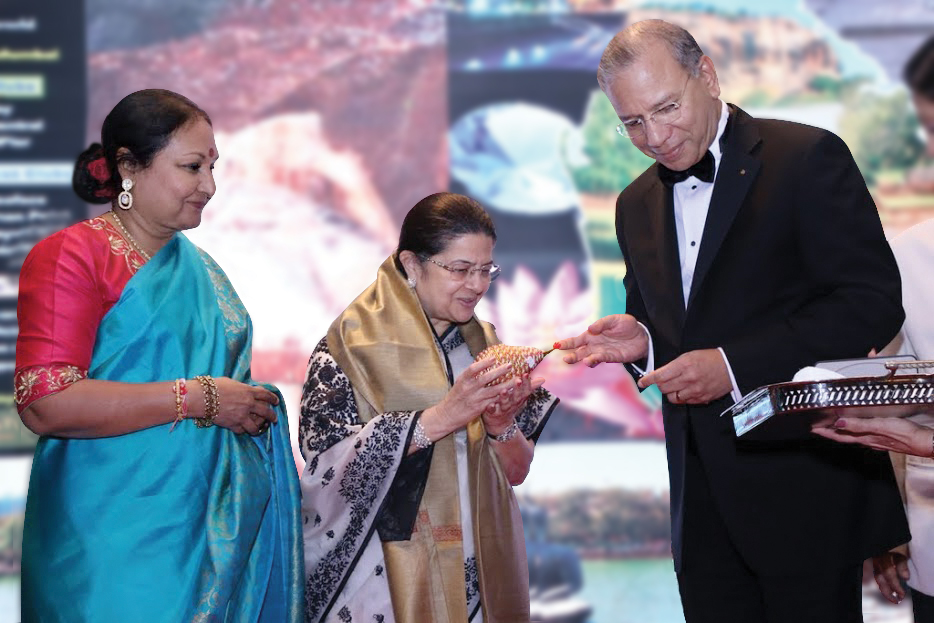
In Rotary, he added, AKS was the highest level of giving, but she had gone well beyond that goal. Describing her as “a citizen of the country,” Saboo said she was born in Bikaner, did her schooling in Madurai, got married and graduated in Kolkata, and lived now in Mumbai. Her initiative and caring had touched millions of lives in India, and had been an invaluable help in Rotary’s efforts to eradicate polio.
Describing the event as “one of the most elegant I have seen in India in the last 15 years,” RI President K R Ravindran said in India, the culture of philanthropy was second to none. “Gandhi had exhorted businessmen: ‘You should regard yourself as the trustees and servants of the poor. Your commerce must be regulated to benefit the toiling millions and you must be satisfied with earning an honest penny.’ ”
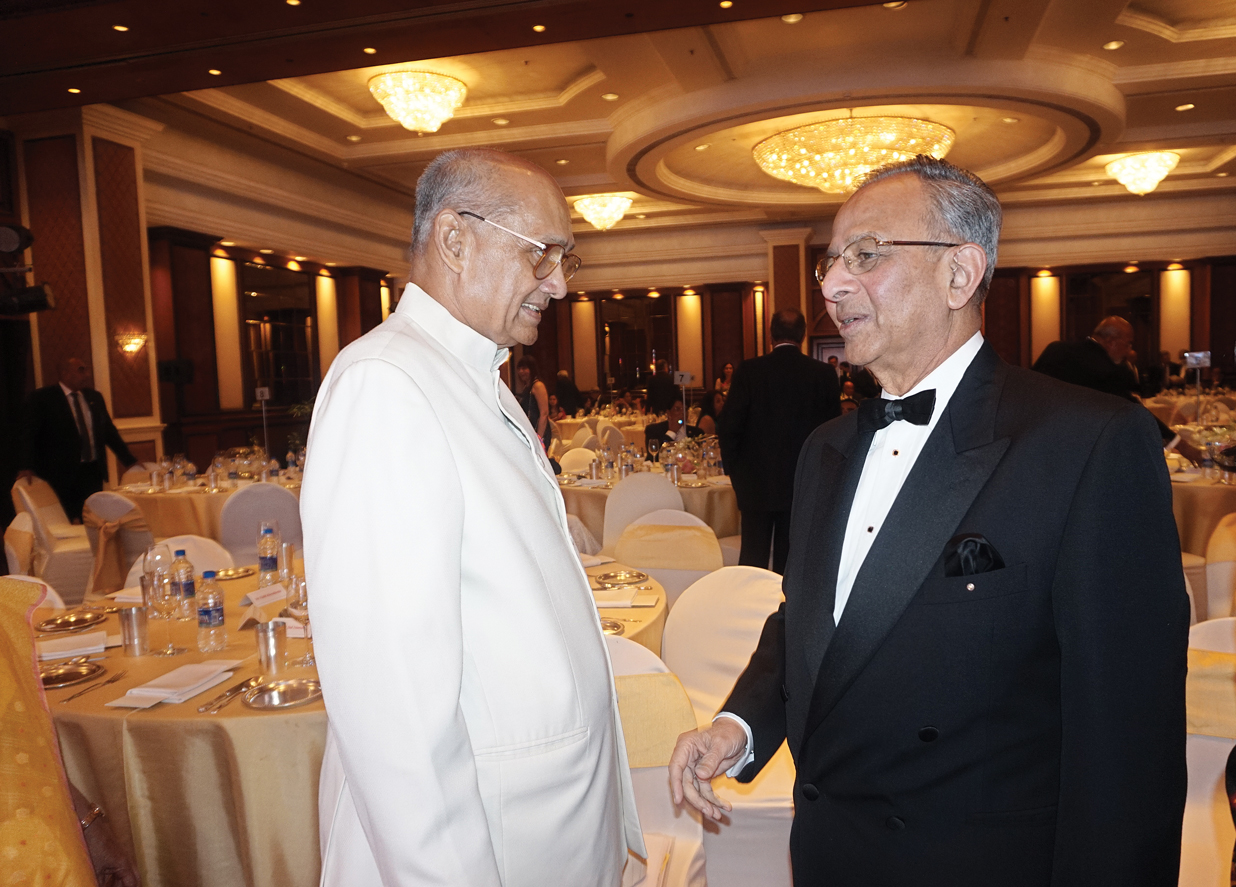
In Gandhi’s freedom struggle were embedded several CSR initiatives. Such as when he cautioned Indian businessmen: “Earn your crores by all means. But understand that your wealth is not yours; it belongs to the people. Take what you require for your legitimate needs, and use the remainder for society.”
One of his greatest supporters was G D Birla, “who put himself and his resources at Gandhi’s disposal — not only for the freedom movement but also for removal of untouchability, popularising khadi and village industries, promoting basic education and Hindu–Muslim unity. The exact amount donated by Birla for Gandhi’s causes is not known to the public, except I suppose to the family, but, according to his biographers, the amount ran into millions of rupees,” he added.
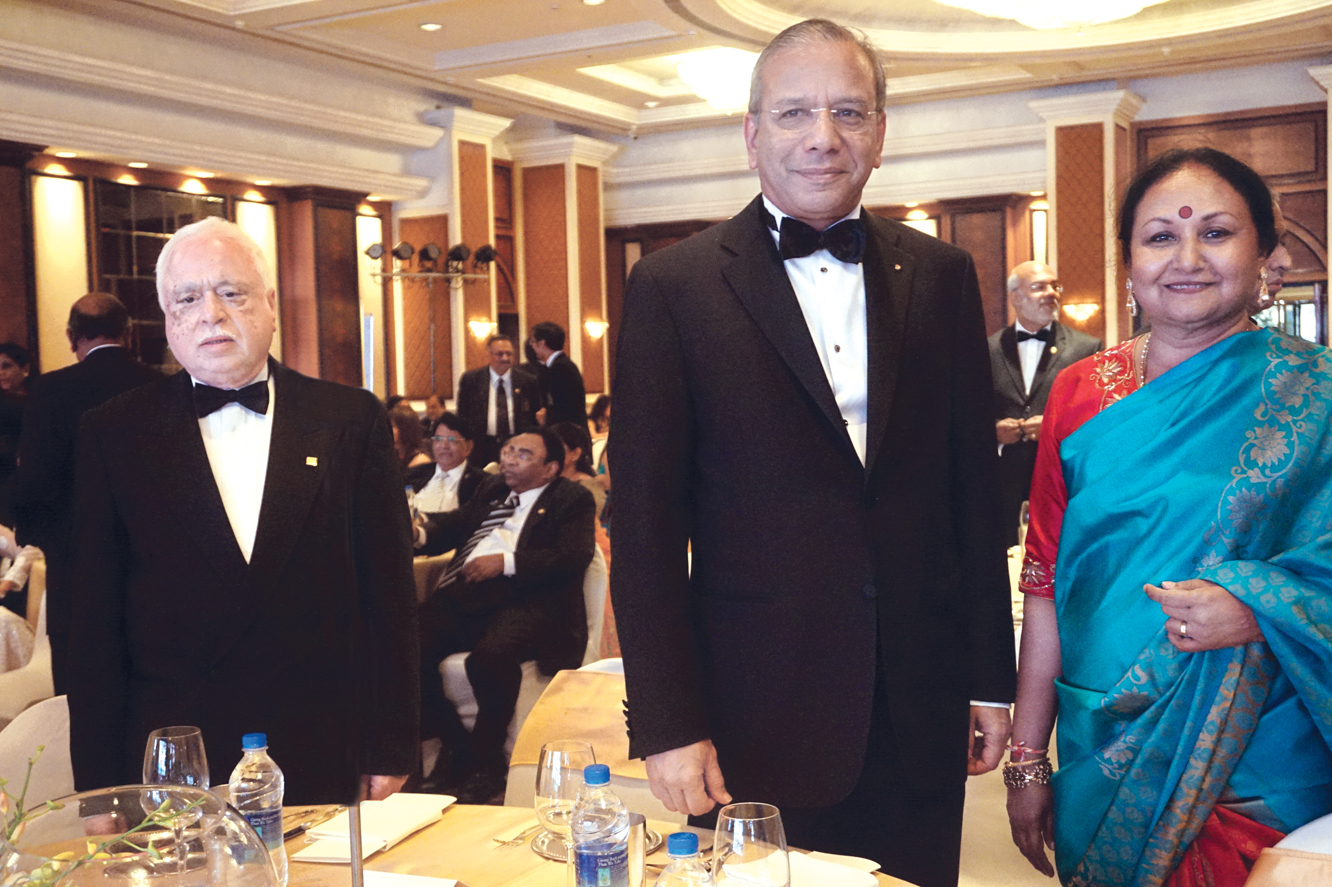
Ravindran with TRF Trustee Sushil Gupta (left).
In this kind of generosity, the Birla family was generations before its time, and looked at CSR “as an obligation long before the idea even had a name. And clearly their investment is one that continues to earn its returns, not only for the Group companies but for all of India.”
Ravindran added that Rajashree’s support for polio’s elimination “which we are recognising here today, goes far beyond generosity … it is visionary. Her gifts have had a real and significant impact on making and keeping India polio-free.
In this journey, I’ve seen ordinary people doing extraordinary work to save children from polio.
– Rajashree Birla
They have changed the course of India’s history and moved the entire country forward, into a healthier and more stable future. And for that, we thank her, and recognise her tonight.”
CSR has today become so important for major corporates that at the British giant retailer Marks & Spencer lobby in London, the huge electronic ticker talks not about the country’s stock price. It details “worthy targets” such as educating 15,000 Ugandan children, saving 55,000 tons of CO2 in a year, tripling sale of organic food, etc.
CSR, “once considered a luxury in the corporate world has today become a necessity,” and features prominently on the curricula of prominent B schools, added Ravindran. In the US, $1 out of every $9 under professional management now involves an element of “socially responsible investment. And an increasing number of investors are choosing socially and environmentally responsible investments, even when the returns are not as high — choosing the welfare of their communities and the planet, over maximum enrichment to their own wealth.”
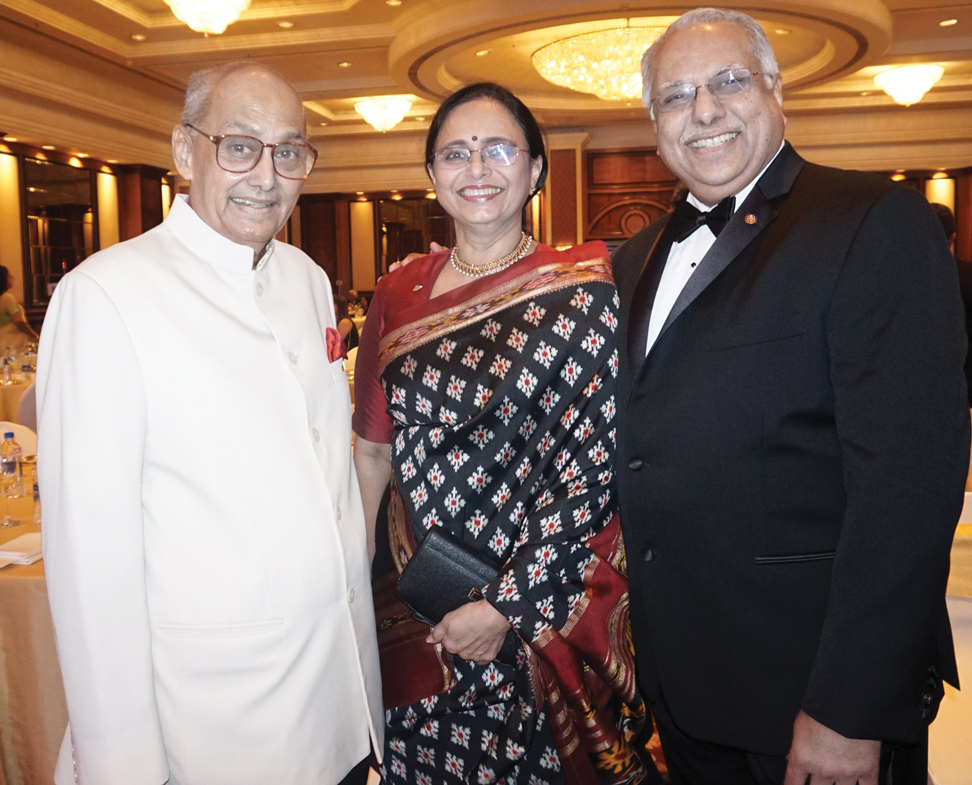
Giving an example of the Gates Foundation, the largest philanthropic body in the world with some $43 billion in current assets, the RI President said, “They have the clout to achieve just about anything, if they chose to pick just one thing.
But they’ve diversified, and formed partnerships, to get the most bang out of every one of those 43 billion bucks. They’re looking at global humanitarian issues in the same way that Rotary is — looking to see where they have the greatest chance of making a significant impact.”
Whether it is the WHO, UNICEF, or the Bill and Melinda Gates Foundation, they have all chosen to partner with TRF.
– Kalyan Banerjee
The Gates could have skipped Rotary as a partner, and gone to work on their own in polio eradication. “But they did not. Instead, they came to us. And instead of saying to the WHO we’ll give you a few hundred million dollars, they came to us in Rotary and said, we are going to match whatever you give.” They did this because they found Rotarians are “passionate in what they do, have a readymade network with which they could reach the whole world, and most importantly, are trustworthy with low administrative costs, a well-managed Foundation to receive their funds, and the ability to disburse them correctly and cost effectively. So the ROI was at its highest.”
And surely for the same reason the Aditya Birla group had decided to work with RI in supporting the Indian government in its polio eradication drive, and had, till date, helped Rotary administer polio drops to over 16 million children. “If we want our children to live in a better world, we need to do what we can, working alongside many others. Because it is the correct thing to do, the ethical thing to do, and the time to do it is now,” concluded Ravindran.
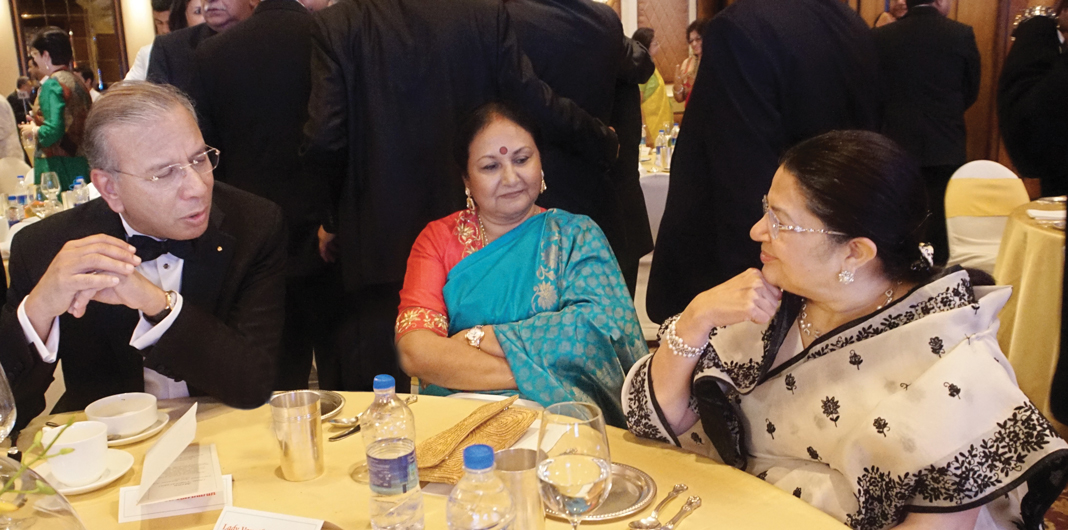
Raising a toast to TRF, its incoming Chair Kalyan Banerjee said individuals, corporates and governments of various countries find TRF a “trusted and totally dependable ally and partner, who is adept at handling some of the most complex issues of the world. When the TRF gives a call, people hear it and respond, as all of you have done tonight.”
Banerjee added that TRF had done over $3 billion worth of service over the world, and spearheaded the demolition of polio from almost every country and was “on the verge of getting Pakistan and Afghanistan polio-free perhaps this very year.”
TRF had not only been changing the world for good, it has been doing so now for almost 100 years. “Today whether it is the WHO, UNICEF, or the Bill and Melinda Gates Foundation,” they had all chosen to partner with TRF. “But Rajashree Birla’s support to polio eradication in India has been unmatched by anybody else.”
I have seen Rajashreeji going to the slums herself, putting drops in the mouths of children; she never stopped to think whether that place was hygienic or not.
– Rajendra K Saboo
And now Rotary clubs in India were engaged in fighting illiteracy, and trying to make India totally literate in a few years. “And when that happens, it will be an event as big as polio. This is what our TRF does: literacy, safe water, rebuilding houses and schools after earthquakes and other natural disasters, providing hundreds of scholarships to students around the world to promote and perpetuate peace and friendship, development and progress across the world. That’s what we have been doing all this time and we are ready to do more.”
But all this wouldn’t have been possible but for support from “individuals who have believed in the causes we espouse, whether they’re Rotarians or non-Rotarians. They are rich not because they have but because they give … to causes they believe in and because they want to change the world. TRF gives ordinary men and women extraordinary opportunities to serve.”
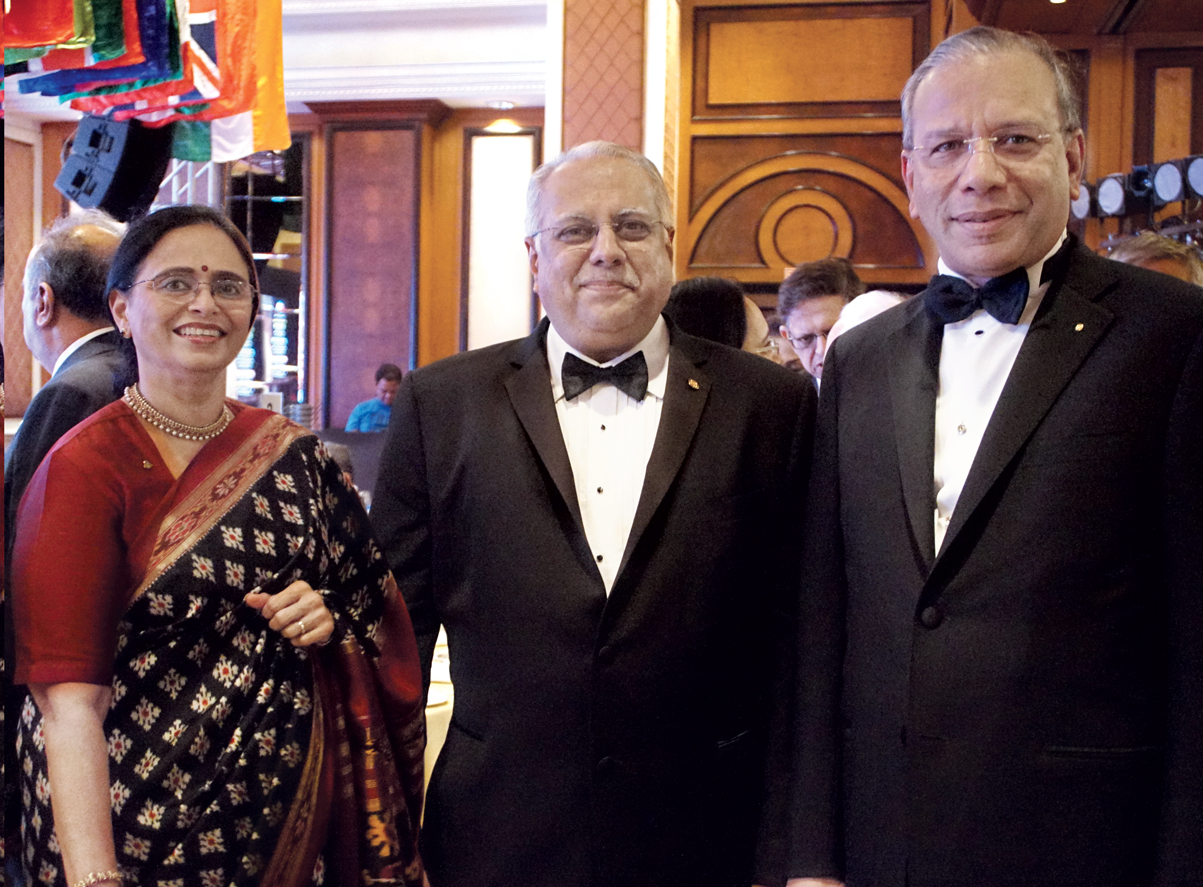
In her response Rajashree said she was “overwhelmed by the affection showered” on her and had “no words to say how much I appreciate this. We at the Birla family cherish our association with Mahatma Gandhi and many such great visionaries and have always said we should strive to set higher standards of service to humanity.”
She said her association with Rotary started when she was introduced to its polio programme by PP of RC Mumbai South Shambhu Kumar and PRID Ashok Mahajan. “We understood that this opportunity to help eradicate polio was another important vista opening up for our Foundation.”
Happy that she and her Foundation were “of some service to the community through Rotary,” Rajashree said, “It is important to see that the sacrifices made by so many people across the world are not in vain and the world is declared polio-free soon.”
Striking a poignant note, she said, “Some of the most memorable experiences came from understanding how you were able to overcome the resistance of the Muslim community in this immunisation drive when India was really struggling to stop the polio virus. In this journey, I’ve seen ordinary people doing extraordinary work to save children from polio. It was very inspiring for me to see what people would give of themselves for the children and their country.”
Congratulating Rotary for the great work it was doing across the world, Rajashree added, “Unless someone like you cares to bring some of the social causes to the forefront, nothing is going to get better.”
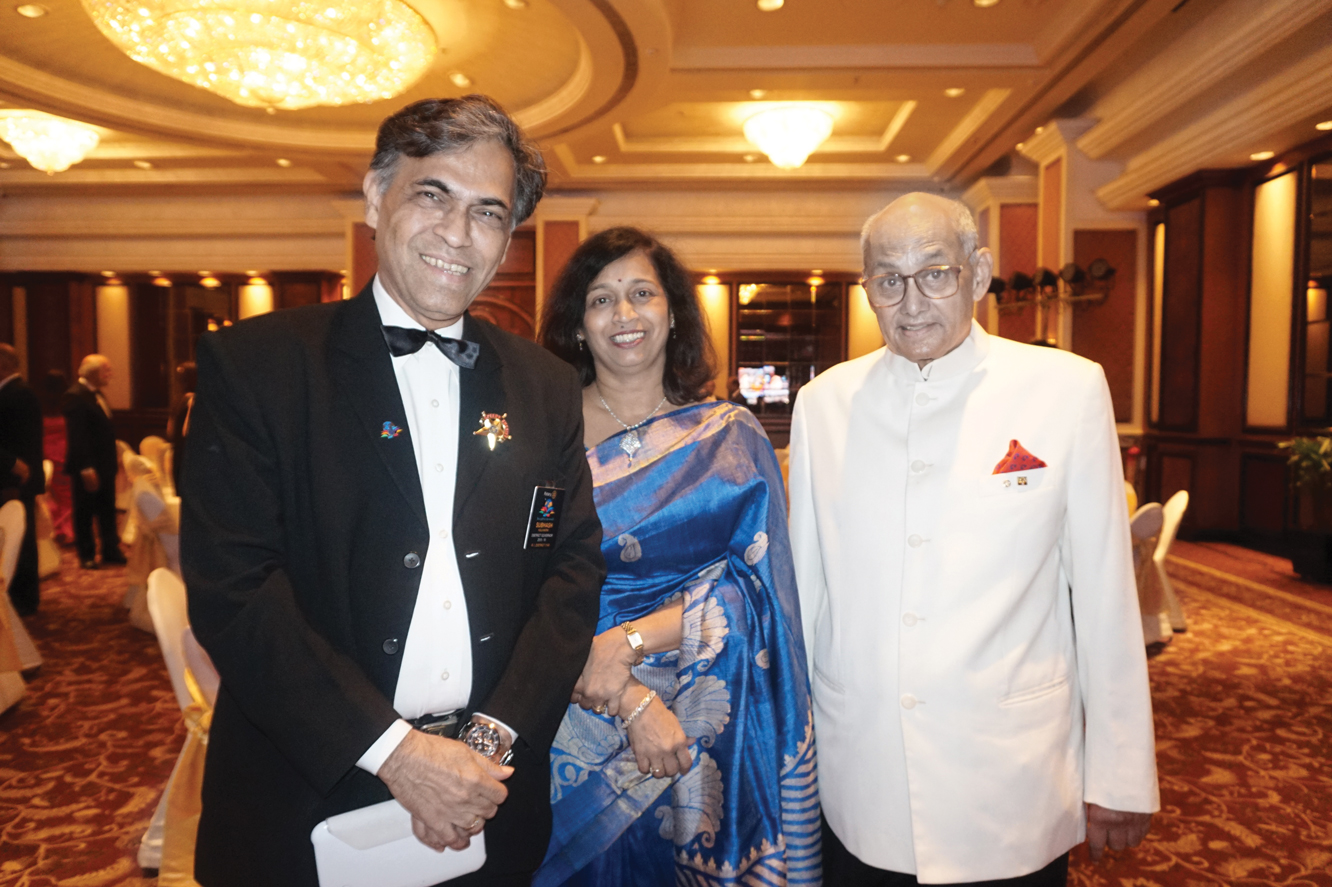
RID Manoj Desai said a black tie dinner in our part of the world is a rare event and it had been organised to honour a benefactor as generous as Rajashree Birla. “You are humility personified and your magnanimity makes India proud.”
By the sheer range and breadth of its work, whether it was polio eradication, disaster relief and management after the Gujarat quake, tsunami or Uttarkashi floods, Rotary had proved that it meets the community’s expectations. At present Rotary India’s two flagship projects were Literacy and Wins, and Ministers in the Government of India were happy to work with Rotary as a “preferred partner,” Desai added.
DG Subhash Kulkarni said District 3140 was forging ahead with many great projects, including TB Bhagao, Zindagi Bachao, through which it hoped to save thousands of lives. Mumbai Rotarians are also engaged in the Swachh Rail Abhiyan, targetted at keeping our railway platforms clean.
Pictures by Rasheeda Bhagat





